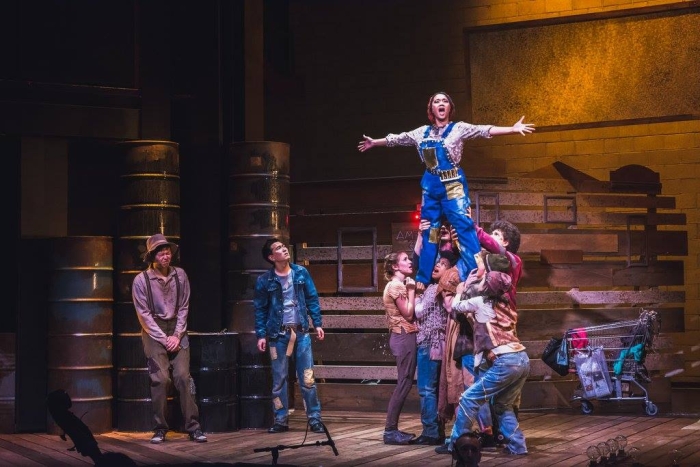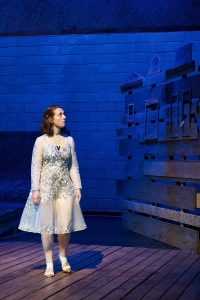
Scripps seniors Victoria Montecillo ’16 and Katie Marcus Reker ’16 are double majoring in media studies and theatre, which means they must complete a thesis project in each subject in order to graduate. For their theatre theses, they chose to star in Urinetown (2001), the Tony Award–winning musical that satirizes capitalism, the legal system, and classic Broadway musicals. The production is staged by the Pomona College Department of Theatre, which serves as the theatre program for all five undergraduate Claremont colleges.
Dorie Bailey ’16 met with Montecillo and Marcus Reker to talk about the show, their roles, and what they have learned by double majoring in the arts.
Dorie Bailey: How did you become involved with Urinetown?
Victoria Montecillo: In February 2015, I was selected to serve on the Pomona College Department of Theatre’s annual play selection committee. The committee proposed staging a musical during this academic year, and all of the committee members wanted to do a performance thesis in a musical specifically.
Katie Marcus Reker: Theatre majors can choose from a variety of different thesis projects—they can give a performance, write a research paper, or propose a special project. I chose a performance thesis as the culmination of my work as an actor, singer, and dancer. Victoria and I were cast in Urinetown in September, and the rest of the cast was selected in January.
DB: Can each of you briefly describe your thesis project?
KMR: The first part of my thesis explores the theoretical framework of Urinetown as a Brechtian-inspired parody of traditional musical theatre. I wanted to look closely at the work’s commentary on topics, including the perils of big business, environmental concerns, and capitalism. Ultimately, I argued that Urinetown isolates audiences’ desires for revolution and social change and fails to create a true Brechtian outcome by reminding its audiences that, “it’s just a musical.” The second part of my thesis explores the process of acting in the production itself.
VM: My thesis specifically looks at how Urinetown uses comedic satire to present and subsequently subvert certain theatrical character stereotypes, such as the young innocent female protagonist, or the ingénue, in order to create multidimensional characters that provide a commentary on characters in theatre in general.
DB: What did you learn from your performances in the musical?
KMR: I played Hope Cladwell, the ingénue, which was a difficult role for me. Her character is dumb, naïve, and a little childish. But I really wanted to show the good parts of her character—that she is warm-hearted, caring, kind, and optimistic. I worked hard to give dimensionality to her character rather than stick to the cartoonlike “dumb-blonde” she is on paper.
VM: Taking on the role of Penelope Pennywise taught me a lot. I learned not to be afraid of a role that is new or different. Initially, I didn’t see her as an appealing character or one who I could ever consider taking on, because she is just not in my comfort zone in terms of the characters who have interested me in the past. I am almost always drawn to the ingénue type role, and the fact that Giovanni Ortega, our director, trusted me with this role, taught me a lot about the importance of challenging myself and taking risks.
DB: How does balancing your double major, and double theses, work? In what ways do the two majors interact, and what have you each learned by pursuing a double major?
KMR: Luckily, the media studies major conducts thesis during the fall semester, so by the time Urinetown really started ramping up, I was already finished with my first thesis. My media studies degree has focused on film and television studies, media’s effect on society, and media and communication; theatre as a media form has come into play a couple times within those frameworks. They do intersect by nature, but they also have their own distinctions and differences.
VM: Doing a double major and two thesis projects has been a huge undertaking, but I don’t regret it at all. Choosing to do two theses allowed me the freedom to pick projects I was genuinely passionate about, instead of struggling to find the perfect project that combined my two majors in a comprehensive way. For my media studies thesis, I chose to do a research paper studying the gender dynamics in comedy television, specifically within a feminist and gender studies context. My theatre thesis project allowed me to pursue a performance-based project in a musical, which was a dream come true for me.
DB: Do you have any advice for anyone considering either of your majors or double majoring in the arts?
VM: I always get so excited whenever I meet anyone even vaguely interested in either theatre or media studies. I have had fantastic experiences in both departments, so it always makes me happy to hear there are more people interested in participating. For anyone considering pursuing a double major, the main piece of advice I can give is to plan—as soon as you know you are even vaguely interested in pursuing more than one major, or a minor, look at the semesters you have left and see if you can fit in all your credits. That way, there won’t be any surprises!
KMR: Our director often tells us that we as artists allow people to see their stories told on stage, validating their emotions and experiences. We feel emotions on stage for a living—what most people are instead taught to hide. There is really nothing like walking out on stage in front of a sold out house and showcasing a piece of art you’ve worked tirelessly to create. People may tell you the arts are worthless, but in reality, they make up some of the most important experiences we as a society and as people can have. Do it anyway. If you love it, do it regardless of what people say.

